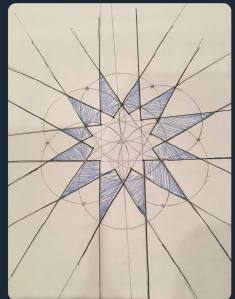“Hi. My name is Megan Schmidt. I’m a former high school math teacher and future PhD candidate. This presentation has nothing to do with either of those things.”
“Full disclosure: This session will not directly connect to something you can take back to your classroom. My goal is for you to learn some simple geometric constructions and my hope is that it inspires you to try more. If, in turn, that gives you some ideas on how to teach standard 9.3.3.2 (transversals and angle relationships), I think that’s fantastic. But in an hour, I’m going to walk you through some of my beginning explorations.”
Here’s what I learned:
1. Anticipating supply needs is hard. My session started with more people than I had compasses. Some MCTM angels found round paper cups, but the best tool was totally a compass, and I only had about 25. I appreciate those who stuck with me, sans compass.


2. Teaching anything in an hour to a room of 60 people is hard. This was more or less a crash course. I was hoping people would be inspired to investigate and play on their own. But there’s a learning curve to working with a compass and straight edge that probably can’t be overcome in 60 minutes. I’m thankful that the session we are doing at Twitter Math Camp will be done over 3 mornings.
3. It’s ok if it doesn’t connect to the math standards. Even though my description didn’t mention a curricular alignment, plus my explicit statement from the beginning, I still received some (anonymous, angry) feedback that my session did not include activities to relate this artwork to “the curriculum.” But the tangible and intangible takeaways from a math conference do not need to be directly transferable to your math classroom. Much of what we teach (in secondary math especially) isn’t transferable anywhere else but to the next secondary math classroom.
4. I really needed a document camera. I was able to adapt my laptop camera for this purpose, but I really needed a document camera. I was facing away from the group the whole time and it wasn’t as good as it could have been for that reason. I did the best I could. But a doc cam would have made it much better.
5. I still really love being deeply entrenched in math education. Being around other passionate math educators is inspiring, empowering, and enriching for me. I’m changing the direction of my career a little, and the last two weeks at NCTM and MCTM reminded me that I still really love mathematics, math education, and the unique conversations that happen amongst math teachers.
